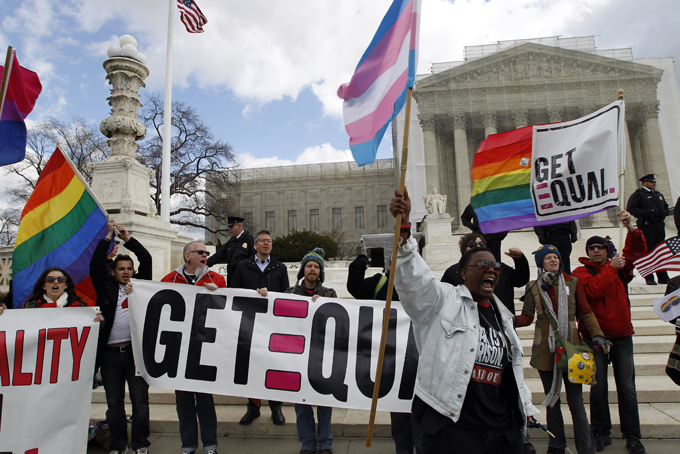
Demonstrators hold flags and chant in front of the Supreme Court in Washington on the second day of gay marriage cases before the court. (AP Photo/Jose Luis Magana, File)
by Sam Hananel
Associated Press Writer
WASHINGTON (AP) — The Supreme Court’s landmark ruling on same-sex marriage has private employers around the country scrambling to make sure their employee benefit plans comply with the law.
The impact of the decision striking down part of the federal Defense of Marriage Act is clear in the 13 states and the District of Columbia where gay marriage is currently legal, or soon will be: Same-sex married couples must be treated the same as other spouses under federal laws governing tax, health care, pensions and other federal benefits.
But employee benefit experts say the effect of the ruling remains murky in the other 37 states. The court left intact another provision of the federal anti-gay marriage law that allows one state not to recognize a same-sex marriage performed elsewhere.
“What’s the federal government going to do when you have a valid marriage in New York and the couple moves to Texas? We don’t know the answer to that,” said Scott Macey, president of the ERISA Industry Committee that represents large employers.
The confusion is creating uncertainty for many companies that operate nationwide and want to administer benefit plans in a uniform manner.
“My members are all across the country,” Macey said. “Most, if not all of them, would prefer to have a consistent rule across the country. They don’t want to worry about changing things from state to state.”
For workers living in states that have legalized same-sex marriage, the Supreme Court’s decision means gay spouses are entitled to a host of benefits they were denied previously. The decision extends pension and Social Security survivor benefits to same-sex spouses, grants equal access to the Family and Medical Leave Act and gives employees married to same-sex spouses the guarantee of uninterrupted health care coverage under the federal COBRA health benefits program.
Same-sex couples can also get the same tax break on health coverage that other couples have been receiving. Before the court’s ruling, same-sex spouses covered by employer health plans had to pay taxes on the benefits they received, which on average added up to an extra $1,000 year. And employees now will be able to seek reimbursement from flexible health spending accounts for the medical expenses of gay spouses.
“This affects a thousand laws and regulations that touch employee benefits,” said Bruce Elliott, manager of compensation and benefits at the Society for Human Resource Management, an industry association.
But many questions were left unanswered by the court. What happens if an employee lives in Maryland, which allows same-sex marriages, but works in neighboring Virginia, which doesn’t? What happens to an employee who has a valid gay marriage in Iowa, but then moves to Alabama, which doesn’t recognize same-sex marriages?